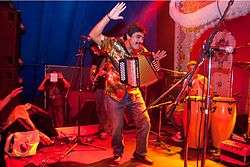Celso Piña
Celso Piña Arvizu (April 6, 1953 – August 21, 2019) was a Mexican singer, composer, arranger, and accordionist,[1] mainly in the genre of Cumbia, being one of the most important musicians in the style of "Cumbia rebajada".
Celso Piña | |
|---|---|
.jpg) Celso Piña in 2012 | |
| Background information | |
| Born | April 6, 1953 Monterrey, Nuevo León, México |
| Died | August 21, 2019 (aged 66) |
| Genres | Cumbia |
| Occupation(s) |
|
| Instruments | Accordion
|
| Years active | 1980-2019 |
| Labels | La Tuna |
| Website | celso |
Piña was a pioneer in the mixture and fusion of tropical sounds with many of his works having elements of cumbia, regional mexicano, cumbia sonidera, ska, reggae, rap/hip-hop, R&B, etc. Piña is also known as El Rebelde del acordeón or the Cacique de la Campana.
Early life
Celso Piña Arvizu was born on April 6, 1953, in Monterrey, Nuevo León, Mexico.[2]
Career

Piña started playing music in his hometown with his brothers Eduardo, Rubén and Enrique. They formed a band called Celso Piña y su Ronda Bogotá[3] and together they would go to several homes and perform for local citizens, especially teenage girls from their neighborhood.
In 1980, Celso Piña bought his first accordion and was introduced to the world of musica norteña. He spent numerous hours of practice and work in the popular district of La Colonia Independencia, south of Monterrey. Having lived for a majority of his life there, he titled one of his songs Mi colonia Independencia, which is located at the heavily populated area of Cerro de la Campana, near of the downtown in Monterrey.
Piña's group decided to change their musical rhythm to encompass a more tropical style during the mid-1980s after having seen Aníbal Velásquez and Alfredo Gutiérrez in concert at "Baile de las Cintas (reproducción de música mediante cintas)". The group decided to switch into the genre of cumbia, and became what today is Celso Piña y su Ronda Bogotá.
Piña taught himself how to play the accordion with no formal training. As a result, he was able to create the unique sound he is well known for. His most popular songs include, La quebradita de la paz, El tren, Como el viento and La piragua by José Barros. He was featured in the song Sufran con lo que yo gozo along with Mexican singer Gloria Trevi.
Celso had several successful international tours that included countries as Germany, Spain, Portugal, Denmark, Sweden, Czech Republic, Italy, France, Switzerland, Morocco, Colombia, Nicaragua, Guatemala, Argentina, Chile, Canada and the United States. Celso Piña received a Latin Grammy nomination for Best Contemporary Tropical Album in 2002 for Barrio Bravo.[4]
On August 21, 2019, Piña died from a heart attack in Monterrey, Mexico at the age of 66.[5]
Discography
|
|
References
- Hernandez, Deborah Pacini (2009-12-28). Oye como va!: hybridity and identity in Latino popular music. Temple University Press. pp. 135–. ISBN 978-1-4399-0090-1. Retrieved 23 September 2011.
- Smith, Harrison (August 22, 2019). "Celso Piña, Mexican cumbia artist and 'accordion rebel,' dies at 66". The Washington Post. Retrieved August 24, 2019.
- Contreras, Felix (August 23, 2019). "Accordion Master Celso Piña Dead At 66". NPR. Retrieved 2019-08-24.
- "The Full List of Nominations". Los Angeles Times. 25 July 2002. Retrieved 9 September 2019.
- "Celso Piña muere a los 66 años". Milenio. Grupo Milenio. 21 August 2019. Retrieved 21 August 2019.
- "Celso Piña: Album Discography". AllMusic. Retrieved 2019-08-24.